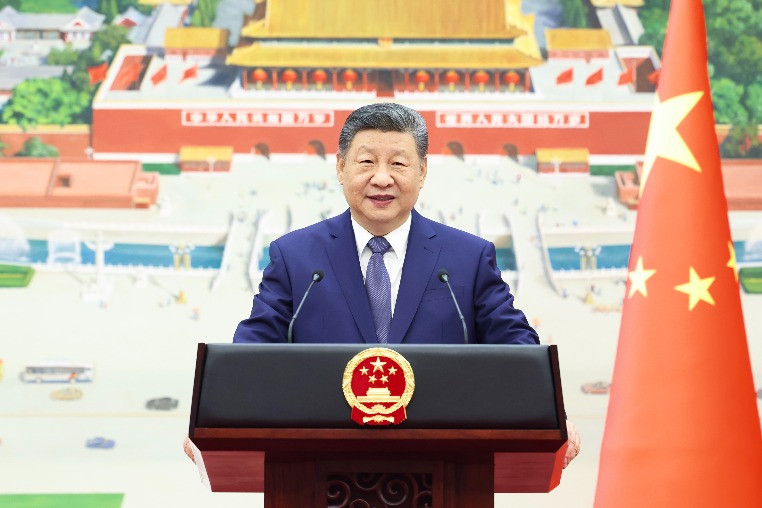New territory for traveler in wine

After wide experience in Europe and south America, sommelier acts as envoy for south African brand
It's an enviable situation for a restaurant to be in when opinion is divided as to whether it is the cuisine or the wine that is the main draw. Andrew White, the sommelier of the Pinotage, says it is a combination of "good wine, good meals, company and good environment" that have popularized the African restaurant over its six years in Beijing.
White, who took charge of the wine side of things this year, has no doubt about his role on Beijing's wine circuit. "I am here to promote South Africa wine and along with it the South African brand as a whole," he says.
In doing so, he has devised a strategy where wine tasting is done at the Pinotage's two restaurants - in the busy expat district of Sanlitun and on the outskirts of the city in Shunyi - deliveries are made to homes, and events are organized.
"We have old vintage red wines that come in ready for enjoying, as opposed to wines from other parts of the world that one has to wait for them to mature," he says, adding that the price range is wide enough to cater for low-end tipplers and high-end connoisseurs.
Pinotage has a supply line from more than 350 South African wineries and sells from 40 yuan ($6.60) to 1,200 yuan a bottle.
"I learned about wine and food early on as a child growing up in Cape Town," says the widely traveled White. "I come from a diverse background with my dad being of Scottish background and my mum of Dutch heritage."
He says his mother encouraged him to experiment with various forms of cooking. "She did draw a line when I wanted to cook a crocodile tail."
After finishing his hotel management course in Cape Town, he trained in the same discipline in London in the late 1990s. After graduating, he was a man on the move - traveling back to South Africa briefly, backpacking in Ecuador, and accompanying his father on trips to Brazil and Bolivia.
On his return to the UK, White found that the property industry seemed to hold much more promise than gastronomy and went into selling mortgages. But when the global financial crisis hit in 2008, it was time for him to hit the road again, this time to Argentina.
Eventually, he returned to South Africa and the restaurant business. He worked at the Jordan restaurant in Cape Town, which was named the third-best restaurant in South Africa at the time.
Life in South Africa was much slower than in London, but in such a laissez-faire environment, the energetic White could thrive.
"I went to Venimark Wines as a wine representative, basically selling wine in various parts of South Africa. I represented about 45 wine farms," he says.
After two years of this, he took up a friend's invitation to try Dubai for work. After looking around, he decided it was good for a short visit "but I wouldn't survive 50 C temperatures for long".
Back in South Africa, he was mulling over his next outbound move when a friend suggested Beijing.
"I didn't have to think too hard about the offer. In fact, when people asked me how long I planned to stay in China, my standard response was 'a little over 12 months and a little under 10 years'," he says.
"China is a fledgling wine-drinking country like South Africa, as discerning people embrace wine culture and turn away from beer and brandy. It's said that if every Chinese wine drinker takes an extra glass a day, all the South African wine would be gone in short order."
Not surprisingly, White big-notes the tradition of South African winemaking compared with other countries.
"We have 350 years' history of winemaking. When we started out, Bordeaux was still a swamp.
"The UK has made major transformations from when it used to be very much an appendage of French food culture. It has also made a break with the fish and chips and pub culture. There are lots of home cooking programs, celebrity chefs and innovation in gastronomic experience."
He is less charitable about his own country when it comes to food culture.
"A good restaurant's popularity in Cape Town lasts on average two years and then people move on to the next best thing in town. The one unifying phenomenon in South Africa is braai or barbecue.
"Thanks to the year-round Mediterranean-like weather, it means one can make a fire outside and throw a steak down, have a beer or wine while waiting for the meat to cook and socializing with friends and family."
As for Chinese food, White says its diversity is due to the vastness of the country, with each region providing a different taste.
For China Daily
| Andrew White promotes South Africa wine in China, and along with it the South African brand as a whole. Liu Zhe / China Daily |
(China Daily Africa Weekly 12/20/2013 page28)
Today's Top News
- Beijing accuses Manila of trying to smear China's actions in the South China Sea
- Scientists using Chinese telesecope capture evolutionary process of mysterious flashes
- Xi: Advance building of China-Canada new strategic partnership
- Xi receives credentials of new ambassadors to China
- China's giant radio telescope observations unravel origin of cosmic enigmatic flashes
- Xi meets Canadian prime minister































